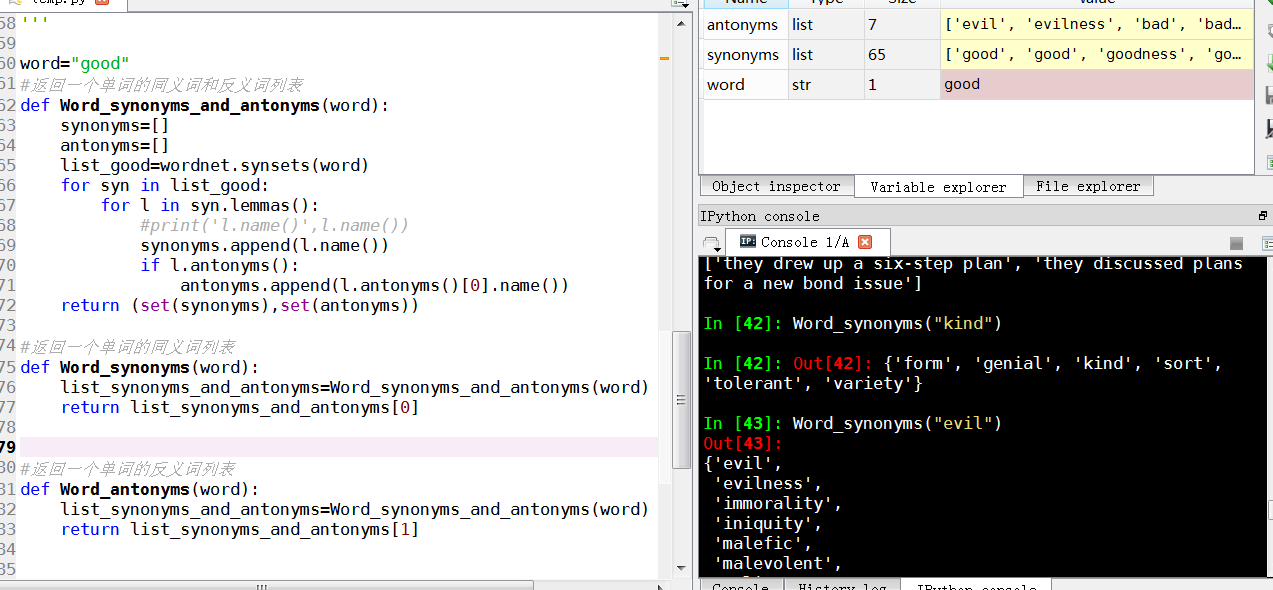python机器学习-乳腺癌细胞挖掘(博主亲自录制视频)https://study.163.com/course/introduction.htm?courseId=1005269003&utm_campaign=commission&utm_source=cp-400000000398149&utm_medium=share
机器学习,统计项目合作QQ:231469242
Wordnet with NLTK
英语的同义词和反义词函数
# -*- coding: utf-8 -*-
"""
Spyder Editor
英语的同义词和反义词函数
"""
import nltk
from nltk.corpus import wordnet
syns=wordnet.synsets('program')
'''
syns
Out[11]:
[Synset('plan.n.01'),
Synset('program.n.02'),
Synset('broadcast.n.02'),
Synset('platform.n.02'),
Synset('program.n.05'),
Synset('course_of_study.n.01'),
Synset('program.n.07'),
Synset('program.n.08'),
Synset('program.v.01'),
Synset('program.v.02')]
'''
print(syns[0].name())
'''
plan.n.01
'''
#just the word只显示文字,lemma要点
print(syns[0].lemmas()[0].name())
'''
plan
'''
#单词句子使用
print(syns[0].examples())
'''
['they drew up a six-step plan', 'they discussed plans for a new bond issue']
'''
'''
synonyms=[]
antonyms=[]
list_good=wordnet.synsets("good")
for syn in list_good:
for l in syn.lemmas():
#print('l.name()',l.name())
synonyms.append(l.name())
if l.antonyms():
antonyms.append(l.antonyms()[0].name())
print(set(synonyms))
print(set(antonyms))
'''
word="good"
#返回一个单词的同义词和反义词列表
def Word_synonyms_and_antonyms(word):
synonyms=[]
antonyms=[]
list_good=wordnet.synsets(word)
for syn in list_good:
for l in syn.lemmas():
#print('l.name()',l.name())
synonyms.append(l.name())
if l.antonyms():
antonyms.append(l.antonyms()[0].name())
return (set(synonyms),set(antonyms))
#返回一个单词的同义词列表
def Word_synonyms(word):
list_synonyms_and_antonyms=Word_synonyms_and_antonyms(word)
return list_synonyms_and_antonyms[0]
#返回一个单词的反义词列表
def Word_antonyms(word):
list_synonyms_and_antonyms=Word_synonyms_and_antonyms(word)
return list_synonyms_and_antonyms[1]
'''
Word_synonyms("evil")
Out[43]:
{'evil',
'evilness',
'immorality',
'iniquity',
'malefic',
'malevolent',
'malign',
'vicious',
'wickedness'}
Word_antonyms('evil')
Out[44]: {'good', 'goodness'}
'''

wordNet是一个英语词汇数据库,普林斯顿大学创建,是nltk语料库的一部分
WordNet is a lexical database for the English language, which was created by Princeton, and is part of the NLTK corpus.
You can use WordNet alongside the NLTK module to find the meanings of words, synonyms同义词, antonyms反义词, and more. Let's cover some examples.
First, you're going to need to import wordnet:
from nltk.corpus import wordnet
Then, we're going to use the term "program" to find synsets 同义词集合like so:
syns = wordnet.synsets("program")
An example of a synset:
print(syns[0].name())
plan.n.01
Just the word: 只显示单词
print(syns[0].lemmas()[0].name())
plan
Definition of that first synset:
print(syns[0].definition())
a series of steps to be carried out or goals to be accomplished
Examples of the word in use:
print(syns[0].examples())
['they drew up a six-step plan', 'they discussed plans for a new bond issue']
Next, how might we discern synonyms and antonyms to a word? The lemmas will be synonyms, and then you can use .antonyms to find the antonyms to the lemmas. As such, we can populate some lists like:
synonyms = []
antonyms = []
for syn in wordnet.synsets("good"):
for l in syn.lemmas():
synonyms.append(l.name())
if l.antonyms():
antonyms.append(l.antonyms()[0].name())
print(set(synonyms))
print(set(antonyms))
As you can see, we got many more synonyms than antonyms, since we just looked up the antonym for the first lemma, but you could easily balance this buy also doing the exact same process for the term "bad."
比较单词近似度
Next, we can also easily use WordNet to compare the similarity of two words and their tenses, by incorporating the Wu and Palmer method for semantic related-ness.
Let's compare the noun of "ship" and "boat:"
w1 = wordnet.synset('ship.n.01')
w2 = wordnet.synset('boat.n.01')
print(w1.wup_similarity(w2))
0.9090909090909091
w1 = wordnet.synset('ship.n.01')
w2 = wordnet.synset('car.n.01')
print(w1.wup_similarity(w2))
0.6956521739130435
w1 = wordnet.synset('ship.n.01')
w2 = wordnet.synset('cat.n.01')
print(w1.wup_similarity(w2))
0.38095238095238093
Next, we're going to pick things up a bit and begin to cover the topic of Text Classification.

